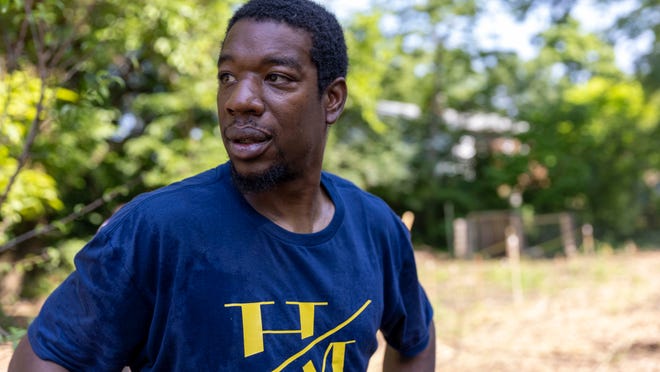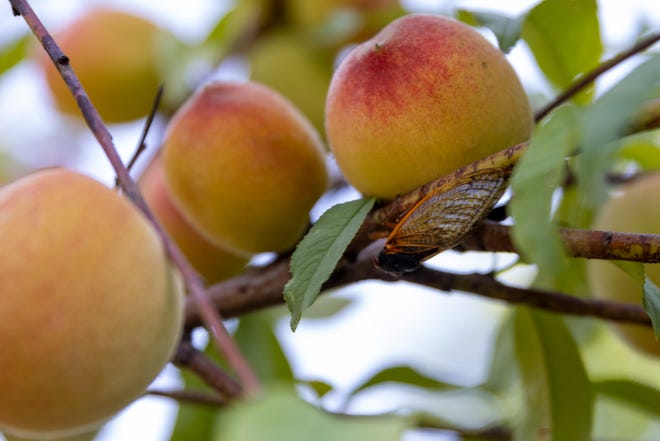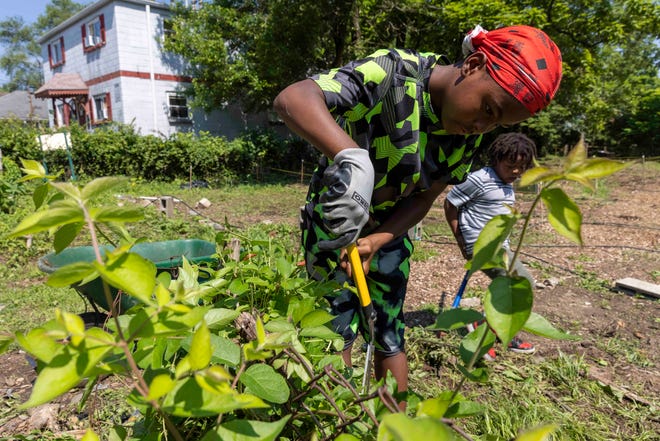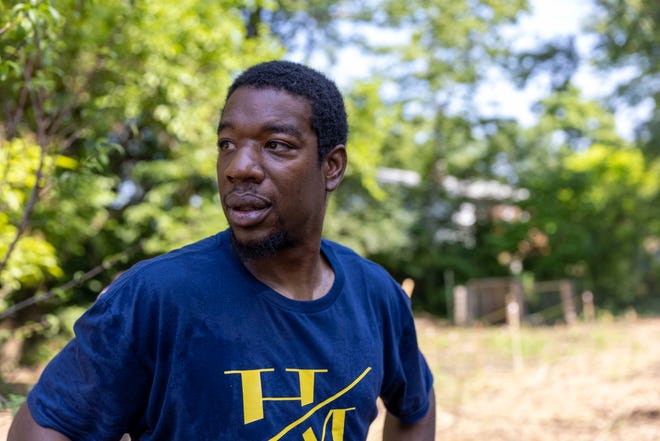

LINCOLN HEIGHTS, Ohio – They show up every Saturday armed with rakes, hoes, shovels, weed trimmers, seeds and, during a recent weekend, fly swatters to keep away cicadas.
These residents hope to feed their town.
Of course, growing your own food isn't easy.
"It's supposed to be carrots," said William Fraley on a recent Saturday morning as he hacked through a mass of vegetation with a rake. "But it's not really carroting. It's more weeds than carrots."
As the issue of food deserts gets more attention nationally and locally, leaders in this predominantly Black suburb just north of Cincinnati hope to improve access to fresh produce and teach the village's youth valuable life skills.
It's not just Lincoln Heights. People in Chicago, Atlanta and other cities have also turned to gardens as a way to improve access to fresh food, the Associated Press reported in 2019.
Fraley, 33, and the organization he's a part of called the Heights Movement, have turned a vacant lot in Lincoln Heights into a small farm called the Jackson Street Produce Market.
This spring, they've planted more than a dozen varieties of crops.

'Everybody has to eat'
The nearest supermarket is only a few miles away in Woodlawn, but it's on congested Springfield Pike. Lincoln Heights is not listed on the U.S. Department of Agriculture's map of food deserts although other locations in Hamilton County and the metro area are.
While those with a car can easily get to the Kroger in Woodlawn, those that have to walk can't, said Daronce Daniels, a Lincoln Heights village councilman.
"If you don't have a mode of transportation, the opportunity to get fresh foods and produce is nonexistent in Lincoln Heights," Daniels said. "On Springfield Pike, it is not a safe walk."
Daniels started the Heights Movement in 2017. It's a group of residents who advocate for Lincoln Heights, a community founded by Black families who moved into the area from the south 75 years ago.
Ninety percent of the residents in the village of 3,300 are Black people. Nearly half the residents, 46%, live under the poverty line, according to the most recent estimates from the U.S. Census Bureau.
The Heights Movement has taken the lead pushing for Cincinnati Police to move its gun range out of the community after 70 years of residents living next to the gunfire on a daily basis.
The issue of access to fresh food and food deserts was also top on Daniels' list when he started the movement.
"It was a way to bring people together to solve a problem," Daniels said. "How do we solve problems? Everybody here likes to grow food. Everybody has to eat."
Lincoln Heights Mayor Ruby Kinsey-Mumphrey doesn't see her village as a food desert with the nearest grocery store less than five miles away. But she does like the small farm.
"It is a great opportunity for residents to know about agriculture," she said.
Teaching life skills
Daniels has enlisted a group of about 40 residents to work in the garden every Saturday. Using a grant from the United Way and the Greater Cincinnati Foundation, the Heights Movement is able to pay a stipend of $50 a day to the workers.
It's not just about food. It's also teaching residents self-reliance, finance and business, Daniels said.
The produce will be sold at Fanci's, a corner market a block away.Proceeds will go back into the operations of the garden. The Heights Movement will bring in bankers to give financial and business tips to the gardeners, he said.
Daniels on Saturday directed about a dozen children and adults through the 100-foot-by-100-foot patch of land. Several teenagers who live at the nearby group home, Acts 1:8 Housing, helped till the soil and cover some of the crops with netting. There were also volunteers from the nearby GE Aviation plant, who have also provided gardening expertise.
They walked over a grid of hoses that extend back to a large water tank, a makeshift irrigation system they're improving as the weeks move on.
Daniels hands Adwana Carter-Dubose a hoe. He asks the 12-year-old Lincoln Heights resident to demonstrate how to get rid of weeds around collard greens that have sprouted.
"Adwana has been doing this the last three weeks. You're the expert" Daniels tells her. The group then watches her dig around the crops. "We really want to clear out the whole area."
Adwana said she's out there every Saturday for the past several months.
"It's not really that hard," she said.
Protecting against deer and squirrels
Right now, the garden looks inconspicuous among the houses and a nearby construction site. A peach tree in the center has sprouted fruit. And tomatoes and collard greens have started to grow.

There are more than a dozen varieties of produce waiting to come out of the ground, including carrots, broccoli, bell peppers, corn, tomatoes, peaches, apples, squash, potatoes, plums, collard greens and kale.
The local wildlife has started to notice. For the first time ever, residents have reported seeing deer in Lincoln Heights, with several sightings around the garden. Keeping nature and wildlife at bay is one of the biggest challenges.
"It's not easy," said Celeste Treece, 34, a member of the Heights Movement who works in the garden. While standing across the street from the garden, she rattled off this year's challenges. "Cicadas have made it very challenging. We've never seen deer in Lincoln Heights. We recently saw deer. We think it's raccoons and squirrels that are eating the broccoli."
By the end of July, the first crop should be in, Daniels said. Eventually, they plan on having a farmer's market regularly at the garden, making it a community gathering spot. They're building picnic tables and will have a mural painted by ArtWorks
"I'm excited about this project, to see how much it grows, see how much it evolves, really seeing how much the community has taken onus of it," Daniels said.
'This is the stuff that is missing'
As the morning wore on, parents and grandparents dropped their children off at the garden. Paula Lee pulled up in a silver sedan and dropped off her grandson Yosiah Williams, 7.
"This is the stuff that is missing," Lee said. "See, my mother taught me how to garden. Lincoln Heights, when I was raised, we did all this kind of stuff. "
Her grandson jumped out of the car as Fraley approached. Fraley put Yosiah to work taking down weeds along the front fence. Within an hour, the overgrowth was gone. And the rows of freshly tilled soil emerged from what was a thicket an hour ago.
"If the pandemic showed us anything, we need to be self-sufficient," Fraley said. "That's another drive behind us, and we'll be able to help the people of Lincoln Heights... When we get the fire pit, the benches set up, it's going to be a beautiful thing."

Source link







